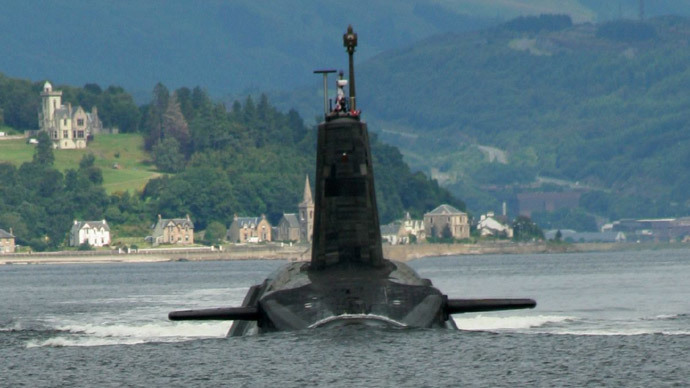‘Nuclear race: Will the UK take moral lead?’ - Church of Scotland rep

The Church of Scotland wants to stop the hypocrisy of the nuclear race, and called on the UK to lead the disarmament, Reverend Doctor Graham Blount told RT after the Church of England urged standing up against the renewal of the Trident weapons system.
Earlier this month, the Church of England sent out a letter urging its members to protest the renewal of the UK’s Trident system, the countries key nuclear weapons system. Both the Church of England and Scotland have come together to discourage the costly renewal project.
Scotland houses four submarines armed with nuclear-capable Trident missiles. Scotland’s ruling party, the Scottish National party is against the program’s renewal. The UK parliament is expected to vote on the issue in 2016, after the general election in May this year. The cost of renewal is estimated at over $30 billion.
RT spoke with Reverend Doctor Graham Blount, the Church of Scotland’s Active Council Secretary, on the Church’s position on nuclear disarmament.
RT:What is the Church of Scotland’s position on nuclear weapons?
Reverend Doctor Graham Blount: For over 30 years now, the General Assembly of the Church of Scotland has expressed its very strong opposition to nuclear weapons and its belief that nuclear weapons are inherently indiscriminate and therefore inherently evil. And therefore in the strongest of terms, we have condemned the possession of nuclear weapons by our own government and by other governments.
READ MORE: 'Wrap up Trident!': Protest in London against £100bn nuke replacement plan
RT:Would you say people in Scotland share the Church’s view on nuclear weapons? Why is it such a hot button issue in Scotland?
GB: There are certainly many people in Scotland who share the Church’s opposition to our possession of nuclear weapons. It’s particularly an issue within Scotland because the United Kingdom’s capability for nuclear weapons is based in Scotland.
RT:Why is the Church’s opposed to the nuclear base?
GB: I would have to say that the Church of Scotland’s opposition to nuclear weapons as a matter of principle is a very long-standing one through a number of changes. It began in the 1980s in a very different context and continues to the present day. Many representatives of the Church of Scotland have taken part in demonstrations. And our opposition has been strongly expressed to government many times over that period.
Our government says that it supports multilateral nuclear disarmament, and obviously we would welcome that, but multilateral disarmament tends to mean countries that have nuclear weapons will say to other countries that we will give up our weapons after you’ve given up yours. And nobody is prepared to make the first move. We need to be serious in our conversations about this and get beyond the hypocrisy of banning other countries from having nuclear weapons while retaining them ourselves.
RT:But nuclear weapons can also be a restraining mechanism, can’t they?
GB: Nuclear weapons are, as I’ve said, inherently indiscriminate. If they were used the destruction would be widespread and could in no sense be targeted. We sometimes persuade ourselves that other forms of modern weaponry can be very precisely targeted at those that are the intended targets. Nuclear weapons go well beyond any kind of possibility of targeting and are indiscriminate. The effects are really beyond our ability to measure at this stage. In that sense, the destructiveness of these is inherently evil.
READ MORE: ‘Ticking time bomb’: Watchdogs slam UK nuclear weapons maker over safety practices
RT:Could the government incorporate the Church position into political discussion?
GB: I think our perspective comes clearly from a set of faith-based values that go beyond the day-to-day intricacies of political discussion. We would hope that these values would inform political discussion not only in our own country but in other countries too. Obviously our concern is with our own government’s possession, but we’re concerned that other governments possess nuclear weapons. They’re inherently evil in whosever’s hands they are.
RT:Why do your calls for disarmament come now?
GB: This is a critical moment because a decision is shortly to be taken by the United Kingdom parliament about the replacement of the current Trident system. Therefore this a moment for us all to stop and think and reconsider the effect that nuclear weapons would have if used. To consider the kind of things that could be done positively with the resources that we are contemplating wasting with a new generation of nuclear weapons.
RT:Do the Churches of England and Scotland see eye to eye on the issue?
GB: I think that there is some difference of opinion between Scotland and England on this and differences surveys suggest that the feelings might be slightly different. But what we’re talking about here is the national church in England saying exactly the same thing as the national church in Scotland is saying. Both of these churches are seeking to give a moral leadership within this debate. Those in Scotland who want to get rid of nuclear weapons would not feel we had achieved a great deal if these nuclear weapons were only moved to the other side of a border with England. We want to get rid of nuclear weapons. That is a priority.
The statements, views and opinions expressed in this column are solely those of the author and do not necessarily represent those of RT.
The statements, views and opinions expressed in this column are solely those of the author and do not necessarily represent those of RT.












